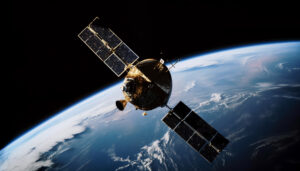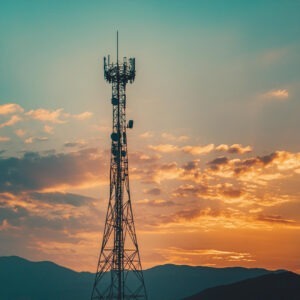Die Zuverlässigkeit und Genauigkeit von GPS-Signalen hängt von einer Vielzahl...
WeiterlesenIn today’s fast-paced world, GPS tracking technology has become an integral part of both industrial operations and our daily lives. From optimizing fleet management to ensuring the safety of our loved ones, GPS tracking has a variety of applications. This article explores the diverse uses of GPS tracking in industrial and consumer contexts and highlights key features and benefits.
GPS - The fundamentals
GPS is based on a network of satellites that orbit the earth and continuously send out signals. These are received by GPS receivers on the ground. To calculate an accurate position, a GPS receiver requires signals from at least four satellites. Each satellite sends signals with precise timing information and its own orbital parameters.
We explain a detailed description of how the GPS position is determined in our article How GPS Works: How Your Device Knows Where You Are
Revolutionizing the industry
1.
Logistics and transport: increase efficiency and reliability
In the logistics and transportation sector, GPS tracking is a game-changer. GPS-equipped fleet management systems help companies monitor and manage their fleets in real-time. This results in optimized routes, reduced fuel consumption and improved delivery times. Inventory tracking ensures that valuable assets such as shipping containers and heavy machinery are always accounted for, preventing theft and improving utilization.
Example
A logistics company uses GPS tracking to monitor its fleet of delivery trucks. Real-time data allows dispatchers to reroute drivers around traffic jams, ensuring on-time deliveries and ultimately customer satisfaction.
2.
Agriculture: Cultivating precision and productivity
Farmers are increasingly turning to GPS technology for precision farming. By using GPS-controlled equipment, farmers can grow, fertilize and harvest crops with unprecedented accuracy, maximizing yield and resource efficiency. GPS collars on livestock allow farmers to monitor the location and health of their animals, improving overall farm management.
Example
A farmer uses GPS-controlled tractors to sow seeds in precise rows, ensuring optimal use of land and resources, resulting in higher crop yields.
3.
Construction: Building smarter and safer
In the construction industry, GPS tracking is critical for equipment tracking and site surveying. Robust GPS devices can withstand harsh conditions and ensure efficient and safe use of machines. Accurate site surveying using GPS technology is critical to planning and executing construction projects.
Example
A construction company tracks its heavy machinery using GPS, preventing unauthorized use and ensuring equipment is used where it is needed most.
4.
Emergency Services: Improve response and coordination
For emergency services, GPS tracking is essential for rapid response and efficient coordination. Dispatch systems use GPS to dispatch the nearest available units to emergencies, reducing response times. Search and rescue operations rely on GPS to locate missing people and optimize efforts.
Example
An emergency medical service uses GPS tracking to navigate through traffic, reach patients more quickly and save lives in critical situations.
5.
Public Transportation: Improving the Commuter Experience
Public transportation systems use GPS to track buses, trains, and other transportation in real time. This increases service reliability and provides passengers with up-to-date information on arrival times and delays.
Example
A city’s public bus system uses GPS to inform riders of bus locations and expected arrival times via a mobile app, improving the overall commuting experience.
Find out more about how to determine the GPS signal faster and more accurately in our article AGPS – A technology to improve GPS performance
Improve everyday life with GPS tracking
1.
Navigation: We accompany you every step of the way
GPS navigation systems in cars and smartphones provide detailed directions, making it easier to reach your destination. Real-time traffic information helps you avoid traffic jams and save time.
Example
A commuter uses a GPS navigation app on his smartphone to find the fastest route to work, avoid traffic jams and save valuable time.
2.
Fitness and Outdoor Activities: Track your progress
Fitness trackers and smartwatches use GPS to monitor running, cycling and other outdoor activities. They provide data on distance, speed and routes to help you achieve your fitness goals.
Example
A runner uses a GPS-enabled smartwatch to track his morning run and analyze his pace and distance covered to improve his performance.
3.
Family and Personal Safety: Keeping your loved ones safe
GPS trackers for children, pets and the elderly provide peace of mind as you can monitor their whereabouts. Geo-fencing features send alerts when you leave a specific area.
Example
A parent uses a GPS tracker to keep an eye on their child’s location on the way home from school to ensure their safety.
4.
Vehicle tracking and theft protection: Protect your assets
GPS tracking devices in vehicles help monitor their location and locate them in the event of theft. Usage-based insurance models use GPS data to adjust premiums based on driving behavior and mileage.
Example
A car owner installs a GPS tracker in his vehicle so that he can quickly locate and recover it in the event of theft.
5.
Location-based services: More convenience
Many apps use GPS for location-based functions, such as: For example, finding nearby friends, tagging locations in social media posts, and providing localized content and recommendations.
Example
A user finds the nearest coffee shop using a location-based app on their smartphone, thereby enjoying a convenient and personalized experience.
Choosing the right GPS tracking device
The design of GPS tracking devices varies depending on their intended use. Here are some important considerations to consider when choosing a GPS tracker:
- Ruggedness and durability: Industrial devices are robust enough to withstand harsh environments, while consumer devices emphasize compactness and portability.
- Battery Life: Long battery life is critical for continuous operation, especially in remote areas.
- Connectivity: Integration with mobile networks or WiFi ensures real-time data transmission.
- Additional features: Depending on the application, the devices may have additional sensors, geofencing and tampering alerts.
Find out more about how the GPS signal is affected in our article The exact position: What factors influence the GPS signal?
Conclusion
GPS tracking technology continues to transform industries and improve everyday life. By understanding the diverse applications and selecting the right device for your needs, you can realize the full potential of GPS tracking, driving efficiency, safety and convenience.
Titelbild: Derek Liang / unsplash
Are you ready to explore GPS tracking solutions for your business or personal use?
Contact us today to discuss the perfect device for your needs!
Or take a look at our online shop.
Related blog articles
Mehr als GNSS/GPS: Alternative Systeme zur Positionsbestimmung auf der Erde
Wenn wir an Standortbestimmung denken, kommen uns häufig globale Navigationssatellitensysteme...
WeiterlesenA-GPS – Eine Technologie zur Verbesserung der GPS-Leistung
Assisted GPS (AGPS), eine Technologie, die eine schnellere Ortung, verbesserte...
Weiterlesen



